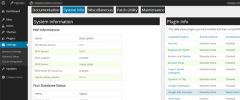SQLite Integration wordpress plugin resources analysis
| Download This Plugin | |
| Download Elegant Themes | |
| Name | SQLite Integration |
| Version | 1.8 |
| Author | Kojima Toshiyasu |
| Rating | 98 |
| Last updated | 2015-03-05 09:01:00 |
| Downloads |
11374
|
| Download Plugins Speed Test plugin for Wordpress | |
Home page
Delta: 0%
Post page
Delta: 0%
Home page PageSpeed score has been degraded by 0%, while Post page PageSpeed score has been degraded by 0%
SQLite Integration plugin added 4 bytes of resources to the Home page and 18 bytes of resources to the sample Post page.
SQLite Integration plugin added 0 new host(s) to the Home page and 0 new host(s) to the sample Post page.
Great! SQLite Integration plugin ads no tables to your Wordpress blog database.This plugin enables you to create WordPress based web sites without MySQL database server. All you've got to prepare is the Apache web server or the like and PHP with PDO extension. WordPress archive and this plugin in hand, you can build a WordPress web site out of the box.
SQLite Integration is a successor to PDO for WordPress plugin, which unfortunately enough, doesn't seem to be maintained any more. SQLite Integration uses the basic idea and structures of that plugin and adds some utilities with more features.
Features
SQLite Integration is a database access engine program, which means it's not like the other plugins. It must be used to install WordPress. Please read the install section. And see more detailed instruction in the SQLite Integration Page.
Once you succeed in installing WordPress, you can use it just like the other systems using MySQL. Optionally, this plugin provides the feature to temporarily change the database to MySQL and come back to SQLite, which may help developers test their sites on the local machines without MySQL.
After you finish installing, you can activate this plugin (this is optional but I recommend you to). And you can see some instructions and useful information on your server or your installed plugins.
System Requirements
- PHP 5.2 or newer with PDO extension (PHP 5.3 or newer is better).
- PDO SQLite driver must be loaded.
Backward Compatibility
If you are using 'PDO for WordPress', you can migrate your database to this plugin. Please check the install section.
Support
Please contact us with the methods below:
- Post to Support Forum.
- Visit the SQLite Integration Page(in English) or SQLite Integration(ja) Page(in Japanese) and leave a message there.
Notes about Support
WordPress.org doesn't officially support using any other database than MySQL. So you will have no supports from WordPress.org. Even if you post to the general Forum, you'll have few chances to get the answer. And if you use patched plugins, you will have no support from the plugin author(s), eithter. I will help you as much as I can, but take your own risk, please.
Translation
Documentation is written in English. If you translate it into your language, please let me know.
- Japanese (kjmtsh)
- Spanish (Pablo Laguna)


